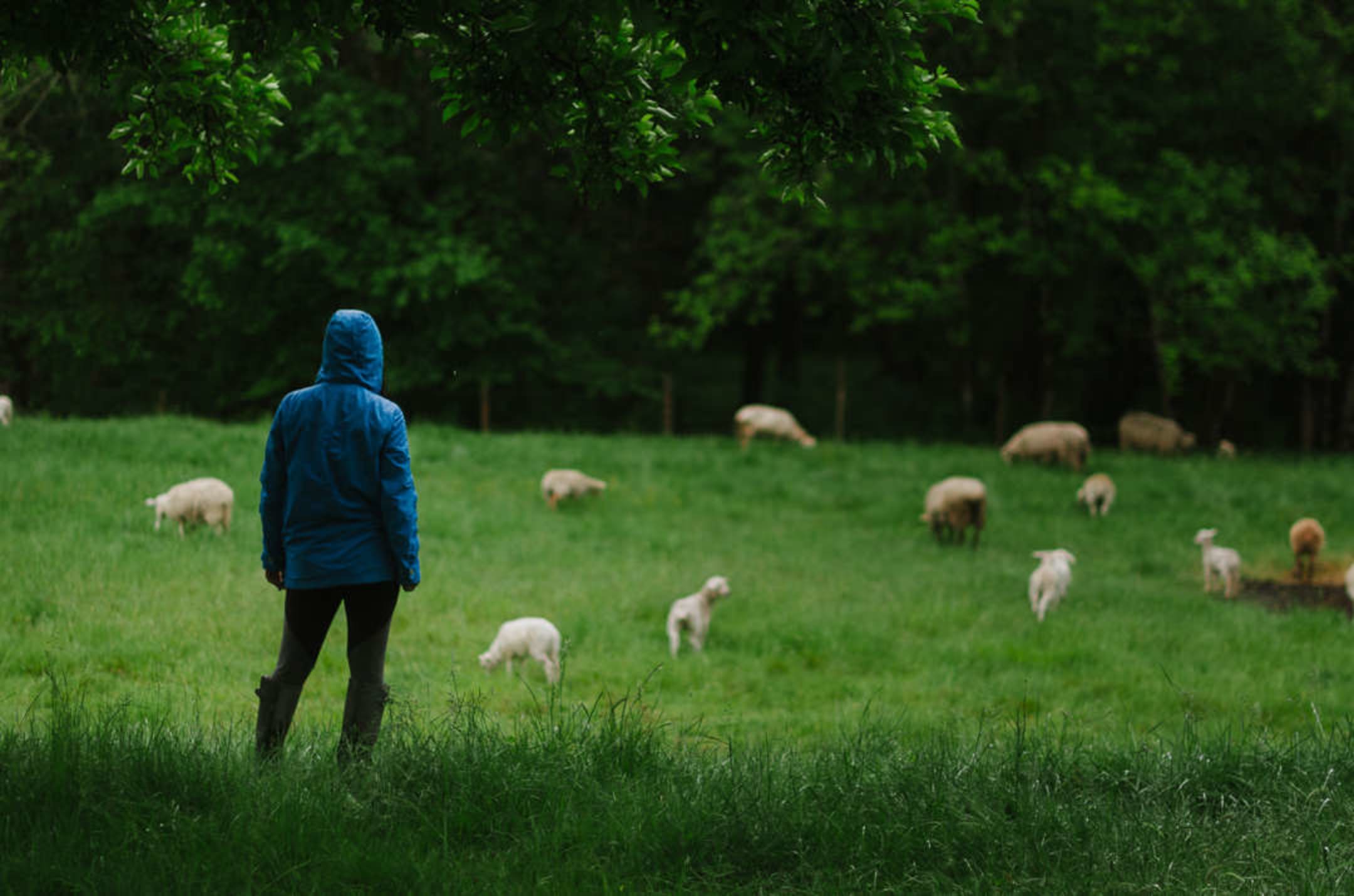Why Stay on a Farm?


My husband and I bought our Oregon farm 14 years ago. We were Phoenix urbanites looking for water and a change of pace. That’s about as far as we delved into what exactly being a farmer entailed. Our farm came with a mixture of smaller livestock, some rusty equipment, a century-old apple orchard, and a peacock. It seemed like an idyllic life choice with beautiful scenery and the requisite historic barn. We thought, “How hard could farming be?”
In hindsight, a business plan might have squelched that naiveté, but idealizing farming isn’t new nor are we the only ones to have gone down that path, even marketing the myth (Does Pepperidge Farm really exist?). Regardless, this is actually a great reason to visit a farm. After all, this is where the food in your fridge starts out — be it livestock or produce, even something simple like eggs (Fair warning: egg-laying chickens are well known as a “gateway livestock”!). Farming is physically demanding; it requires skill and education, and even a bit of luck. It’s a risky business. It’s also a 7-day-a-week job that some will joke is a lifestyle, not a living. But it also brings clarity to pricing at your local farmers’ market. Exactly how much time and labor does it take on the part of the farmer to get those eggs to your fridge?
Most small farms ($100K or less in sales) require off-farm jobs to support the family. We were no different. Which leads me to the creative thinking required to make a living on a farm, also known as ‘value-added’ (thanks USDA). That would be the jam, goat cheese, wool, or soap you’ll find on Etsy, at the farmers’ market, or at the roadside farm stand. For us, it was the addition of a ‘farm stay’ to our operations. Farm stays – overnight lodging provided on the farm for a fee – are as varied as the farms offering them. You might find yourself in a tent on the back-40, a cabin, a yurt, even a room in the farm house; and, often your stay includes a farm-fresh breakfast and a rooster alarm clock.
Yup, we farmers are looking at diversification strategies (wow, we sounds like hedge fund managers) that include the hospitality business and inviting strangers to experience our lifestyle. It helps pay for tractor maintenance, but it also allows us to share our vistas as well as our challenges with urbanites and travelers, often disconnected from the natural world in ways that would have our grandparents shaking their collective heads. We know. We were those urbanites—until we weren’t.
And, it’s not dirty and boring the way you might think. Okay, well the lodging isn’t dirty, although helping around the farm might involve some dirt. Boring never factors in because… farms aren’t boring. Maybe you’ll help collect eggs, brush the donkey, even hold a baby lamb. Maybe you’ll sit on the farm house porch and read a good book, drink the local brew, unwind and unplug. You’ll be our guest for a weekend or a week.
In the end, that’s also why we decided to list with Hipcamp. We share an affinity with folks who are focused on experiencing the natural world. We appreciate the curiosity, the questions, the hands-on interest in helping us, and the respect we receive for the work we do. You see our farm as what might have been if your own grandparents or great-grandparents had been able to save the farm. It’s the romance many of us hold in our mind to be kids again in the hayloft, to tumble through the bales, to smell the sweet grass.
So this is why you would want to stay on a farm. It’s a bridge to the country. It’s a boon to the farm (it saved ours). It’s fun and unexpected, and your friends will think you are crazy, until you return home with tales of feeding a baby goat, and then they will want to go too. You’ll be protecting small-farm America that at one point built this country. You’re a patriot! Okay, bit of a stretch, but at least you have found a unique, relaxing vacation spot… and are now contemplating chickens for the back yard!
The U.S. Farm Stay Association is a strategic partner with Hipcamp because of their shared values and mission and has started to recommend Hipcamp listings to its farms for ease of booking. Its website, Farm Stay U.S. (www.farmstayus.com), promotes over 850 farm stays around the country.
Scottie Jones and her husband, Greg, have hosted guests at their Leaping Lamb Farm in Alsea, Oregon since 2006. Their farm is listed on Hipcamp. Scottie also founded and runs the U.S. Farm Stay Association.
Recent Posts
Synchronous Fireflies: Your Guide to the Great Smokies’ Annual Light Show in 2024
Up and down the Eastern US, fireflies (or lightning bugs) are an essential part of summer nights, twinkling against the…
Morel Mushroom Hunting Season: The 2024 Camping Guide
Spring is springing. And we all know what that means—the 2024 morel mushroom season is underway. To increase your chances…
Top Wildflower Hikes in the Great Smokies
Great Smoky Mountains National Park glows every shade of green in spring and early summer, its lush forest landscape featuring…
These Hipcamp Hosts are Making the World a Better Place
We couldn’t be more proud to partner with thousands of incredible Hipcamp Hosts who share their land with others, opening…
Where to See Bluebonnet Fields in Texas This Spring
As the days grow warmer under the Texas springtime sun, the green spaces along the roads and highways of the…
Host Spotlight: How These Texas Retirees Have Maintained a Perfect Rating for 7 Years
Landowners are partnering with Hipcamp to earn extra money by connecting their properties with folks looking to stay and camp…